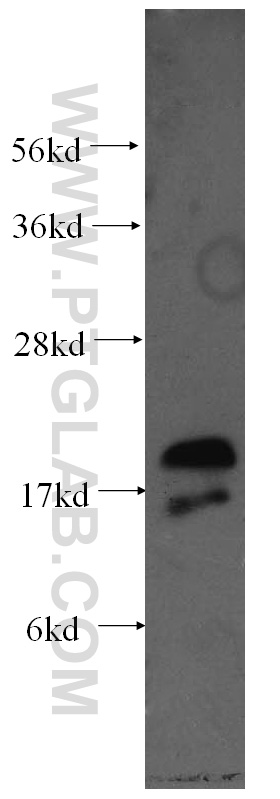验证数据展示
经过测试的应用
| Positive WB detected in | U-937 cells |
推荐稀释比
| 应用 | 推荐稀释比 |
|---|---|
| Western Blot (WB) | WB : 1:500-1:1000 |
| It is recommended that this reagent should be titrated in each testing system to obtain optimal results. | |
| Sample-dependent, Check data in validation data gallery. | |
产品信息
60101-1-Ig targets IFN-gamma in WB, ELISA applications and shows reactivity with human samples.
| 经测试应用 | WB, ELISA Application Description |
| 经测试反应性 | human |
| 免疫原 |
CatNo: Ag8320 Product name: Recombinant human IFNG protein Source: e coli.-derived, PET28a Tag: 6*His Domain: 22-166 aa of BC070256 Sequence: YCQDPYVKEAENLKKYFNAGHSDVADNGTLFLGILKNWKEESDRKIMQSQIVSFYFKLFKNFKDDQSIQKSVETIKEDMNVKFFNSNKKKRDDFEKLTNYSVTDLNVQRKAIHELIQVMAELSPAAKTGKRKRSQMLFRGRRASQ 种属同源性预测 |
| 宿主/亚型 | Mouse / IgG2a |
| 抗体类别 | Monoclonal |
| 产品类型 | Antibody |
| 全称 | IFN gamma |
| 别名 | IFNG, IFN-gamma,IFN gamma,IFN γ,IFNγ, IFN γ, IFN gamma, IFG |
| 计算分子量 | 166 aa, 19 kDa |
| 观测分子量 | 25 kDa |
| GenBank蛋白编号 | BC070256 |
| 基因名称 | IFNG |
| Gene ID (NCBI) | 3458 |
| ENSEMBL Gene ID | ENSG00000111537 |
| 偶联类型 | Unconjugated |
| 形式 | Liquid |
| 纯化方式 | Protein A purification |
| UNIPROT ID | P01579 |
| 储存缓冲液 | PBS with 0.02% sodium azide and 50% glycerol, pH 7.3. |
| 储存条件 | Store at -20°C. Stable for one year after shipment. Aliquoting is unnecessary for -20oC storage. |
背景介绍
IFNG is a soluble cytokine that is the only member of the type II class of IFNs. It is secreted by Th1 cells, cytotoxic T cells and NK cells. The cytokine is associated with antiviral, immunoregulatory and anti-tumor properties and is a potent activator of macrophages. It plays crucial roles in pathogen clearance. Aberrant IFNG expression is associated with a number of autoinflammatory and autoimmune diseases. It has been identified in many studies as a biomarker for pleural tuberculosis (TB). Mutations in this gene are associated with aplastic anemia.


